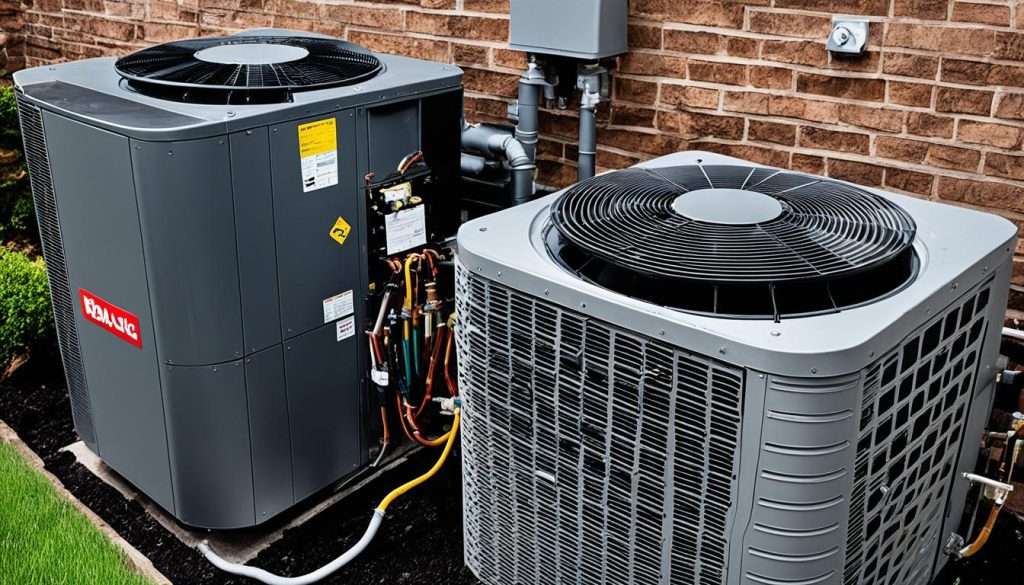Are you thinking the cost to replace your HVAC system in New Jersey is low? Think again. Replacing an NJ air conditioning unit involves many factors that can change the final cost. These include the unit’s type and size, as well as its energy efficiency ratings. Knowing these details is key to planning a budget that fits your home’s specific needs.
So, how can you make sure you’re making a smart choice? Let’s explore the factors that affect the cost and how to plan your budget wisely.
Key Takeaways
- The average HVAC installation cost in New Jersey can range from $5,200 to $12,000 for central air conditioning installations.
- Labor for air conditioning unit replacements typically falls between $2,500 and $7,500.
- Factors like unit type, efficiency ratings, ductwork modifications, and electrical work greatly influence the total expense.
- Seeking a tailored estimate from professional HVAC contractors is advisable for precise budgeting.
- Investing in a high-quality HVAC system may reduce energy bills and potentially increase property value over time.
Introduction to HVAC Replacement Costs in New Jersey
Replacing an HVAC system in New Jersey can be a big financial step for homeowners. The cost depends on several key factors.
The size and power of the system greatly affect the cost. It’s important to get a system that fits your home well for efficient cooling. Ductwork changes and the complexity of electrical work also add to the total cost.
For a full upgrade of your cooling and heating, working with trusted HVAC contractors in New Jersey is key. They can plan the installation or replacement carefully. This ensures you get comfort now and save money later.
Factors Influencing HVAC Replacement Costs
Replacing an HVAC unit involves several key factors that affect the cost. The size and power of the air conditioning system are big factors. Bigger units cost more because they cool or heat larger areas well.
The HVAC efficiency rating is also important. Units with high SEER ratings are pricier at first but save money on bills over time.
The state of the ductwork matters too. Ductwork modification expenses can change a lot. If your ducts need a lot of work, like resizing or fixing leaks, the cost will go up.
The age and design of your home also affect the price. In places like New Jersey, older homes might need more work for proper drainage and wiring. This can make the replacement more expensive.
Getting a pro for installation is key. Experts handle the unique needs and challenges of each job. They look at all the costs, like the HVAC efficiency rating and ductwork changes, to give you the best option.
Average Costs to Replace an HVAC Unit in New Jersey
Homeowners in New Jersey looking to upgrade their HVAC systems need to know the costs. The average cost to replace an HVAC unit is between $4,600 and $9,000. Most people spend about $6,800. But, costs can go up to $12,000 based on several factors.
- Home Size: The size of your home affects the cost. Bigger homes need more powerful systems.
- Insulation Quality: Good insulation can lower costs by reducing the need for heating and cooling.
- Window Count: More windows mean you might need a stronger unit to keep your home comfortable.
- SEER Rating and Tonnage: The SEER rating and unit size also play a part in the cost. Better SEER ratings and larger units cost more.
Choosing the right HVAC system for your home is key. The right unit uses less energy, works better, and saves money. By matching your home’s size and insulation with the right system, you can control costs. This way, you can handle HVAC replacement expenses in NJ and stay within your budget.
Cost Breakdown for Different Types of HVAC Units
When looking at HVAC unit price comparisons, many factors matter. These include the type, size, and how well they use energy. Modulating furnaces, for example, cost more upfront but use energy better.
- Air conditioning units have prices based on their size, known as tonnage. A 2-ton unit costs about $2,620, while a 5-ton unit is around $3,690.
- Furnaces are priced by their British Thermal Units (BTUs). Higher BTUs mean they cost more because they heat more.
The brand of an energy-efficient system also affects its price. Brands like American Standard, Bryant, and Goodman have different prices. This choice can influence what buyers pick during a HVAC unit price comparison.
Installation costs add to the total price. If a house needs a lot of ductwork or big improvements, the labor costs go up. These costs are key to figuring out the total cost of an energy-efficient system.
When looking at AC units by tonnage or other HVAC parts, think about both the cost of the unit and the installation. This way, you can plan your budget better for good climate control.
Importance of Professional Installation
Getting a pro to install your HVAC unit is a wise move. It keeps your heating and cooling system safe and working right. Experts make sure the system fits your home’s size and electrical setup perfectly.
One big plus of professional installation benefits is following local laws and building codes. This is key in places like New Jersey. Technicians know how to handle tricky spots, like installing in townhouses or condos. They might need special gear, like hoists or custom enclosures, making the job harder and pricier.
Experts also make your unit work better and use less energy. They set it up to run efficiently, which means you’re comfy and save money over time. Getting it right means fewer repairs later and a longer life for your system.
Choosing a skilled HVAC contractor also makes your setup safer. A pro checks everything is hooked up right, avoiding dangers like gas leaks or electrical issues. This is crucial for a safe and reliable system, giving you peace of mind.
To wrap it up, hiring pros for your HVAC installation has big perks. It helps your unit last longer, keeps you safe, and follows the rules. Using experts really makes a big difference in having a system that works well and saves you money.
Potential Long-Term Savings with Efficient Units
Buying energy-saving HVAC systems with high SEER ratings can save money now and later. These systems use less energy, which means lower electricity bills over time. Even though they cost more at first, they pay for themselves with savings.
These efficient models use less power to cool your home. This means you save money every month. Choosing these systems helps you save money and is good for the planet.
- Reduced electricity usage: High SEER ratings make these units cheaper to run over time.
- Lower monthly bills: These systems save you money every month.
- Environmental benefits: They cut down on carbon emissions, helping the planet.
When picking an HVAC unit, look at its SEER rating and cost-effectiveness. These efficient units offer long-term savings and are a smart choice for homeowners.
Conclusion
Replacing an HVAC unit in New Jersey requires careful thought. You need to look at the system’s size, efficiency, and the ductwork’s complexity. The brand you choose also matters a lot. These factors greatly affect the cost and benefits of the investment.
For homeowners, saving on home climate control costs is key. Picking the right-sized HVAC system means using energy wisely and getting the best performance. This leads to lower bills and a smaller carbon footprint. Working with skilled HVAC contractors in New Jersey such as Dauria & Son Heating and Air, helps homeowners find the right balance between initial costs and long-term savings.
Installing a new AC unit in NJ means doing your homework and getting expert advice. Homeowners should think about the big savings and better living conditions a new unit offers. Making an informed choice leads to a comfortable and affordable home for many years.





